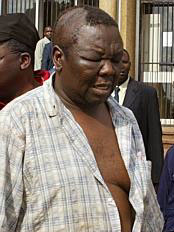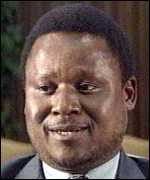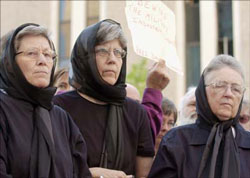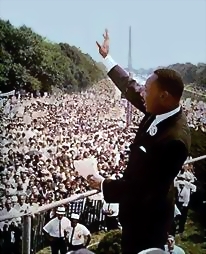We Must Obey God Rather Than Men:
With Gratitude to Morgan Tsvangirai
For Sunday April 15, 2007
Lectionary Readings (Revised Common Lectionary, Year C)
Acts 5:27–32
Psalm 118:14–29 or Psalm 150
Revelation 1:4–8
John 20:19–31
 |
Morgan Tsvangirai leaves the Harare Magistrate's Court. |
On Sunday March 11, 2007, Morgan Tsvangirai, former presidential candidate and founder of Zimbabwe's Movement for Democratic Change, drove to the Highfield suburb of Zimbabwe's capital of Harare to attend a prayer meeting that local churches had organized. He knew that Robert Mugabe, Zimbabwe's eighty-three year old dictator and the country's only ruler since independence in 1980, had brutally repressed all forms of political dissent, but he hoped that they might fly under the radar.
They had come "to seek divine intervention," said Tsvangirai, to pray for an end to 27 years of Mugabe's autocratic rule that has plunged Zimbabwe into economic free fall (1700% inflation and 80% unemployment), electoral fraud, chaotic land reform, massive starvation, political terror, and egregious human rights abuses. Three million citizens, a quarter of the population, have left the country. Life expectancy at birth is barely 40, and a quarter of the population has HIV-AIDS.
In Highfield riot police prevented people from entering the prayer venue. When Tsvangirai saw that the police far outnumbered the prayer-protesters, and that ordinary citizens were in grave danger, he canceled the event and returned to his home in Strathaven 12 miles away. Besides, being committed to peaceful protest and non-violence, he wanted to avoid a confrontation.
Later that day, when Tsvangirai returned to the Machipisa Police Station to see some 40 of his supporters who had been jailed, police savagely beat him and his driver. He lost consciousness and awoke in "a crowded, hot, filthy and cockroach-infested police cell." But he remained defiant rather than deterred: "Far from killing my spirit, the scars they brutally inflicted on me have re-energised me. I seek no martyrdom. I only seek a new dispensation in my country, in which citizens live freely, in prosperity, and not in perpetual fear of their own rulers."1
 |
Frank Chikane. |
Tsvangirai personifies the truth of two texts from this week's lectionary, that "we must obey God rather than men" (Acts 5:29), and that Jesus is "the ruler of the kings of the earth" (Revelation 1:5). If Jesus is King and Lord over all earthly rulers, then the Roman caesar was decidedly not lord at all, despite its claim that the Roman state was divine and its cult of imperial worship. The two readings remind us that Christians should never confuse the relative claim to "render to Caesar what is Caesar's" with the absolute and unconditional claim to "render to God what is God's" (Matthew 22:21). As much as is possible, we "honor the king," but as Tsvangirai so bravely demonstrated, it is God alone whom we "fear" (1 Peter 2:17).
Tsvangirai is in good company; he follows in the footsteps of many Christians, both famous and anonymous, who've challenged state power that has terrorized people and propagated a rhetoric to legitimize it. Here are three more examples of Christians who "obeyed God rather than men."
In 1934 (Dachau was opened in March of 1933), Germany's "Confessing Church" published the Barmen Declaration to repudiate the nationalism and anti-Semitism of the "German Christian movement" and its appeal to the Bible to support the Nazis: "We reject the false doctrine that beyond its special [ie, limited] commission the State should and could become the sole and total order of human life and so fulfil the vocation of the Church as well." Capitulating to the Nazi status quo was unacceptable to Germany's "Confessing Church."
At the instigation of Frank Chikane, a black pentecostal pastor, in 1985 more than 150 clergy from 20 denominations drafted the Kairos Document to protest South African apartheid. It disavowed what it called "state theology" that is "simply the theological justification of the status quo with its racism, capitalism and totalitarianism. It blesses injustice, canonizes the will of the powerful and reduces the poor to passivity, obedience and apathy." It also critiqued so-called "church theology" which in a "limited, guarded and cautious way" was superficially critical of apartheid. Its timid criticism of the state, moreover, was defective because it was based upon an individualistic and privatistic piety that ignored a rigorous analysis of the South African social and political dynamics.
 |
Ardeth Platte, Carol Gilbert and Jackie Hudson. |
In July 2003, the Dominican nuns Ardeth Platte, Carol Gilbert and Jackie Hudson, members of a peace community in Baltimore called Jonah House that was founded by the dissident priest Daniel Berrigan, were sentenced to 34 months each in federal prison for sabotaging the national defense and damaging government property. They had protested nuclear weapons by smearing a cross on a Minuteman silo with their own blood and pounding on it with hammers.
Acts 5:29 is the perfect text for this Sunday when the world commemorates Holocaust Memorial Day (Yom HaShoah) to honor the memory of the six million Jews who were systematically exterminated by the Nazis in some 35 countries, and with them an additional three to four million people whom the Nazis deemed undesirable and inferior "enemies of the state"—gays, gypsies, Jehovah's Witnesses, Soviet prisoners of war, Slavic people, the physically and mentally disabled, and political dissidents of every sort.
Yom HaShoah also provides an opportunity to contemplate the other holocausts of the last hundred years—a million Armenians under the Turks; two million Cambodians under the Khmer Rouge and Pol Pot; Kurds under Saddam Hussein; Muslims, Croats, and ethnic Albanians under the Serbs; nearly a million ethnic Tutsis and moderate Hutus by extremist Hutus in Rwanda; and now in Darfur the Fur, Zaghawa, and Massaleit peoples by the Janjaweed (literally, "devils on horseback") supported by Sudan's government.
 |
Martin Luther King, Jr. |
In light of these atrocities of the past hundred years, the words of Acts 5:29 assume special importance. To obey God rather than man, wrote the Yale historian Jaroslav Pelikan, "and to protest that human laws of the state and nation cannot contravene the divine law of the sovereign God, has been the unanimous teaching of both the Old and New Testament, as well as the subsequent history of the church since the earliest centuries. Moses before Pharaoh, Elijah before Ahab and Jezebel, John the Baptist before Herod, Paul before the Sanhedrin and before Festus—and Ambrose before Theodosius, Theodore of Studios before Constantine the VI, Luther before Charles V at the Diet of Worms, and Martin Luther King before the power structure of White America—all were expressing this obligation to appeal from the abuse of political power by human authorities to the ultimate sovereignty of God." Likewise Morgan Tsvangirai.
Morgan Tsvangirai, God bless and keep you and Zimbabwe. Far from forgotten, you are an inspiration to the entire world.
For further reflection:
* Have you ever "obeyed God rather than men"?
* What contemporary applications of Acts 5:29 can you think of?
* To what extent should a Christian support the laws and policies of its nation?
* See Samantha Power's Pulitzer Prize winner, A Problem from Hell: America and the Age of Genocide
[1] Cape Times, March 16, 2007.





